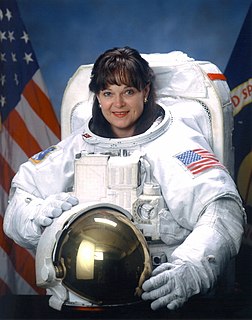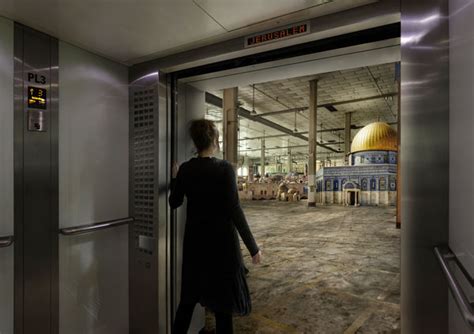Top 1200 Hubble Space Telescope Quotes & Sayings - Page 20
Explore popular Hubble Space Telescope quotes.
Last updated on April 19, 2025.
This whole issue of limits to growth, which provides a psychological, as well as a physical, cap on potential expansion of activity and awareness, has had a very depressing effect on many people.... I don't for a moment think that there's any concept which anyone's working with now which will be followed as a straightforward scenario. But the idea embodied in concepts such as space colonization or space industrialization, or availability of nonterrestrial resources, is fundamental, and it will change the way in which people look at the future.
Superhero science has taught me this: Entire universes fit comfortably inside our skulls. Not just one or two but endless universes can be packed into that dark, wet, and bony hollow without breaking it open from the inside. The space in our heads will stretch to accommodate them all. The real doorway to the fifth dimension was always right here. Inside. That infinite interior space contains all the divine, the alien, and the unworldly we’ll ever need.
I would love to see the world's space programs continue toward sending humans to an asteroid or to Mars, with, of course, a full plan in place to bring them back. That excites me. And one of the things that excites me most about space is that we can go up there and put spacecraft in orbit with sensors that will help us measure the health of our planet, which is becoming particularly important. Our planet needs to be observed.
Mankind's journey into space, like every great voyage of discovery, will become part of our unending journey of liberation. In the limitless reaches of space, we will find liberation from tyranny, from scarcity, from ignorance and from war. We will find the means to protect this Earth and to nurture every human life, and to explore the universe. . . .This is our mission, this is our destiny.
... the only other place comparable to these marvelous nether regions, must surely be naked space itself, out far beyond atmosphere, between the stars, where sunlight has no grip upon the dust and rubbish of planetary air, where the blackness of space, the shining planets, comets, suns, and stars must really be closely akin to the world of life as it appears to the eyes of an awed human being, in the open ocean, one half mile down.
It is impossible not to feel stirred at the thought of the emotions of man at certain historic moments of adventure and discovery - Columbus when he first saw the Western shore, Pizarro when he stared at the Pacific Ocean, Franklin when the electric spark came from the string of his kite, Galileo when he first turned his telescope to the heavens. Such moments are also granted to students in the abstract regions of thought, and high among them must be placed the morning when Descartes lay in bed and invented the method of co-ordinate geometry.
I define Inner Space as an imaginary realm in which on the one hand the outer world of reality, and on the other the inner world of the mind meet and merge. Now, in the landscapes of the surrealist painters, for example, one sees the regions of Inner Space; and increasingly I believe that we will encounter in film and literature scenes which are neither solely realistic nor fantastic. In a sense, it will be a movement in the interzone between both spheres.
It is possible to make buildings by stringing together patterns, in a rather loose way. A building made like this, is an assembly of patterns. It is not dense. It is not profound. But it is also possible to put patterns together in such a way that many patterns overlap in the same physical space: the building is very dense; it has many meanings captured in a small space; and through this density, it becomes profound.
Mars is the next frontier, what the Wild West was, what America was 500 years ago. It's time to strike out anew....Mars is where the action is for the next thousand years....The characteristic of human nature, and perhaps our simian branch of the family, is curiosity and exploration. When we stop doing that, we won't be humans anymore. I've seen far more in my lifetime than I ever dreamed. Many of our problems on Earth can only be solved by space technology....The next step is in space. It's inevitable.
Charles Bernstein's pairs of jingles of 'public discourse' are 'simultaneous double narrative / the space between's the other narrative/as if they're opposite.' In the space between, outside representation but in the 'presence' of it, we are provoked to laugh. Bernstein alters our language to open a double range that's public and mind at once and inseparable, that is 'Poetry is patterned thought in search of unpatterned mind.' Girly Man is doing it.
For me, architects and film directors operate similarly. They are practical. As an architect, you know what you want in the conception of a space - but you still need a lot of people to help you out. You need an engineer, interior architects. But a film is the same - you have all these elements. But in terms of concept, it's always about time. When you approach a building, you need time to go from point A to B. Buildings are designed as a journey and films are the same, you have an opening that you come through, an angle you follow, maybe a disruption in space.
We have looked first at man with his vanities and greed and his problems of a day or a year; and then only, and from this biased point of view, we have looked outward at the earth he has inhabited so briefly and at the universe in which our earth is so minute a part. Yet these are the great realities, and against them we see our human problems in a different perspective. Perhaps if we reversed the telescope and looked at man down these long vistas, we should find less time and inclination to plan for our own destruction.
The Hopi, an Indian tribe, have a language as sophisticated as ours, but no tenses for past, present and future. The division does not exist. What does this say about time? Matter, that thing the most solid and the well-known, which you are holding in your hands and which makes up your body, is now known to be mostly empty space. Empty space and points of light. What does this say about the reality of the world?
World War Two was a world war in space. It spread from Europe to Japan, to the Soviet Union, etc. World War Two was quite different from World War One which was geographically limited to Europe. But in the case of the Gulf War, we are dealing with a war which is extremely local in space, but global in time, since it is the first 'live' war.
Every place is given its character by certain patterns of events that keep on happening there. These patterns of events are locked in with certain geometric patterns in the space. Indeed, each building and each town is ultimately made out of these patterns in the space, and out of nothing else; they are the atoms and molecules from which a building or a town is made.
I think it modern society as a whole, but definitively in Brazil, spaces are so well divided and there are so many barriers, and so many divisions, so many lines and so many borderlines, basically telling you that you should be here but not here. This is my space and this is your space, and this is expressed very dramatically in architecture, we have a very kind of aggressive, almost medieval concept for architecture, which is basically keeping people out. So you get high walls, fences, and electric fences, and divisions like that.
Meditation is the emptying of the mind of all the things that the mind has put together. If you do that -perhaps you won't, but it doesn't matter, just listen to this- you will find that there is an extraordinary space in the mind, and that space is freedom. So you must demand freedom at the very beginning, and not just wait, hoping to have it at the end. You must seek out the significance of freedom in your work, in your relationships, in everything that you do. Then you will find that meditation is creation.
Sci-fi uses the images that sf - starting with H.G. Wells - made familiar: space travel, aliens, galactic wars and federations, time machines, et cetera, taking them literally, not caring if they are possible or even plausible. It has no interest in or relation to real science or technology. It's fantasy in space suits. Spectacle. Wizards with lasers. Kids with ray guns. I've written both, but I have to say I respect science fiction enough that I wince when people call it sci-fi.
One problem with people is that as soon as they fill a space it's them you see and not the space. Large, desolate landscapes stop being large, desolate landscapes once they have people in them. They define what the eye sees. And the human eye is almost always directed at other humans. In this way an illusion is created that humans are more important than those things on earth which are not human. It's a sick illusion.
A thinking mind is not swallowed up by what it comes to know. It reaches out to grasp something related to itself and to its present knowledge (and so knowable in some degree) but also separate from itself and from its present knowledge (not identical with these). In any act of thinking, the mind must reach across this space between known and unknown, linking one to the other but also keeping visible to difference. It is an erotic space.
At two-tenths the speed of light, dust and atoms might not do significant damage even in a voyage of 40 years, but the faster you go, the worse it is--space begins to become abrasive. When you begin to approach the speed of light, hydrogen atoms become cosmic-ray particles, and they will fry the crew. ...So 60,000 kilometers per second may be the practical speed limit for space travel.
It has always been my experience that, whatever groupings I choose for my books, the space in which I plan to lodge them necessarily reshapes my choice and, more important, in no time proves too small for them and forces me to change my arrangement. In a library, no empty shelf remains empty for long. Like Nature, libraries abhor a vacuum, and the problem of space is inherent in the very nature of any collection of books.
Oh, my dear Kepler, how I wish that we could have one hearty laugh together. Here, at Padua, is the principal professor of philosophy, whom I have repeatedly and urgently requested to look at the moon and planets through my glass, [telescope] which he pertinaciously refuses to do. Why are you not here? what shouts of laughter we should have at this glorious folly! and to hear the professor of philosophy at Pisa laboring before the grand duke with logical arguments, as if with magical incantations, to charm the new planets out of the sky.
Exercise is very important, first of all if you think about it, especially in a long flight like a six month space flight and on the ISS. If you didn't exercise and used the analogy on earth, it would be like laying in bed. So, just imagine laying in bed for several months, and even just trying to get up and walk, you probably wouldn't be able to. But if you got up and you exercised two hours a day, you'd probably be okay, and that's the same in space.
Vocal music is an attempt to take the whole human being and project it into space. It is the ultimate gesture of getting out of yourself. You take a part of you that is most private, most personal, most inward and you hurl it out into space - you project it as far as you can. That gesture of opining this whole region of the body results in an enormous spiritual release, and is felt by other people with tremendous impact.
Any time you do something, you make decisions about time and space. I wanted those decisions to be out of my hands. I could be dragged, carried along by another person, I could be a receiver. I could be the agent of the overall scheme, but I didn't want to be the agent of the particular action. I could make the ultimate decision that my space is going to change now, but I don't know where it's going to go.
Sacred space and sacred time and something joyous to do is all we need. Almost anything then becomes a continuous and increasing joy. What you have to do, you do with play. I think a good way to conceive of sacred space is as a playground. If what you're doing seems like play, you are in it. But you can't play with my toys, you have to have your own. Your life should have yielded some. Older people play with life experiences and realizations or with thoughts they like to entertain. In my case, I have books I like to read that don't lead anywhere.
I am in a space now where I can try anything; and with Pink Floyd we've always been in a space where we were able to try out anything. I think we were very young then and we were very keen to experiment and try things out. It seems to me that this sort of experimenting is like working yourself towards something and trying to find what you like and what you want.
One of the things that makes it so challenging is that we're constructing the Station hundreds of miles above the surface of the Earth and we're doing it one piece at a time For the International Space Station we do not have the privilege of assuming the Space Station is on the ground before we take it up one piece at a time. So we have to be very clever about the testing that we do and the training that we do to make sure that each mission is successful, and that each piece and each mission goes just as it's planned.
Alas! What is man? Whether he be deprived of that light which is from on high, of whether he discard it, a frail and trembling creature; standing on time, that bleak and narrow isthmus between two eternities, he sees nothing but impenetrable darkness on the one hand, and doubt, distrust, and conjecture, still more perplexing, on the other. Most gladly would he take an observation, as to whence he has come, or whither he is going; alas, he has not the means: his telescope is too dim, his compass too wavering, his plummet too short.
My reluctance to use alien invasion is due to the feeling that we are not likely to be invaded and taken over. It would seem to me that by the time a race has achieved deep space capability it would have matured to a point where it would have no thought of dominating another intelligent species. Further than this, there should be no economic necessity of its doing so. By the time it was able to go into deep space, it must have arrived at an energy source which would not be based on planetary natural resources.
Here I shall add that the concept of change, and with it the concept of motion, as change of place, is possible only through and in the representation of time. & Motion, for example, presupposes the perception of something movable. But space considered in itself contains nothing movable; consequently motion must be something which is found in space only through experience -in other words, is an empirical datum.
I wanted to get that scholarship to - a division one scholarship and play ball and go to school for free. And that, to me, was - I was always about getting to that next step. If I could get to that next place, then I could figure out essentially what to do with being in that space and how to manage my time and handle those - handle all the benefits of being in that space in a way that would get me to the next place.
Ambient means the natural center or atmosphere of a space. All music has that in it- a space or center. I think it just means the atmosphere or what defines the environment of sound and maybe removing the more destructive, harsh elements and harder rhythmic elements and you get down to the stillness that's inherent. There's an ambient quality in every sound. You may have to enhance that to hear it or bring it out in a different way but there is that in every environmental sound.
You can put this another way by saying that while in other sciences the instruments you use are things external to yourself (things like microscopes and telescopes), the instrument through which you see God is your whole self. And if a man's self is not kept clean and bright, his glimpse of God will be blurred - like the Moon seen through a dirty telescope. That is why horrible nations have horrible religions: they have been looking at God through a dirty lens.
We have indeed been out in space, but some are under the illusion that we have been off Earth. In reality humans have never been off Earth. We have always been on a piece of Earth in space. We survive only as long as we can breathe the air of Earth, drink its waters, and be nourished by its foods. There is no indication that as humans we will ever live anywhere else in the universe. Place, too, is continuously being transformed but only within its own possibilities.
We debase the richness of both nature and our own minds if we view the great pageant of our intellectual history as a compendium of new information leading from primal superstition to final exactitude. We know that the sun is hub of our little corner of the universe, and that ties of genealogy connect all living things on our planet, because these theories assemble and explain so much otherwise disparate and unrelated information not because Galileo trained his telescope on the moons of Jupiter or because Darwin took a ride on a Galápagos tortoise.
Once the threshold is crossed when there is a self-sustaining level of life in space, then life's long-range future will be secure irrespective of any of the risks on Earth. Will this happen before our technological civilization disintegrates, leaving this as a might-have-been? Will the self-sustaining space communities be established before a catastrophe sets back the prospect of any such enterprise, perhaps foreclosing it forever? We live at what could be a defining moment for the cosmos.
Solitude is a condition of peace that stands in direct opposition to loneliness. Loneliness is like sitting in an empty room and being aware of the space around you. It is a condition of separateness. Solitude is becoming one with the space around you. It is a condition of union. loneliness is small, solitude is large. loneliness closes in around you; solitude expands toward the infinite. loneliness has its roots in words, in an internal conversation that nodbody answers; solitude has it's roots in the great silence of eternity.
Supposing we knew that up there is some alien civilization and it's sending radio signals our way we should not tell the public where that is. We could say that we've picked up a signal, but we should not tell them where for the simple reason that anybody could commandeer a radio telescope, set themselves up as some self appointed spokesperson of mankind and start beaming all sorts of crazy messages back to the aliens.
Everyone who's been in space would, I'm sure, welcome the opportunity for a return to the exhilarating experiences there. For me, a flight in a shuttle, though most satisfying, would be anticlimactic after my flight to the moon. Plus, if I pursued a flight myself, people would think that was the reason I am trying to generate interest in public spaceflight. And that's not the purpose - I want to generate interest in long-range space exploration.
Individuals inherit a particular space within an interlocking set of social relationships; lacking that space, they are nobody, or at best a stranger or an outcast. To know oneself as such a social person is however not to occupy a static and fixed position. It is to find oneself placed at a certain point on a journey with set goals; to move through life is to make progress - or to fail to make progress - toward a given end.
If we discovered that, you know, space aliens were planning to attack and we needed a massive buildup to counter the space alien threat and really inflation and budget deficits took secondary place to that, this slump would be over in 18 months. ... There was a Twilight Zone episode like this in which scientists fake an alien threat in order to achieve world peace. Well, this time, we don't need it, we need it in order to get some fiscal stimulus.
A new space race has begun, and most Americans are not even aware of it. This race is not about political prestige or military power. This new race involves the whole human species in a contest against time. All of the people of the Earth are in a desperate race against disaster... To save the Earth we must look beyond it, to interplanetary space. To present the collapse of civilization and the end of the world as we know it, we must understand that our planet does not exist in isolation.
There is, therefore, no difficulty in answering such questions as these. What cause was there why the Universe was placed in such a part of Space? and, Why was the Universe created at such a Time? for, if there be no Space beyond the Universe, it was impossible that it should be created in another place; and if there was no Time before, it was impossible it should be created at another time.
Bistromathics itself is simply a revolutionary new way of understanding the behavior of numbers. Just as Einstein observed that space was not an absolute but depended on the observer's movement in space, and that time was not an absolute, but depended on the observer's movement in time, so it is now realized that numbers are not absolute, but depend on the observer's movement in restaurants.
It felt really nice to not have anybody talking about numbers, and no one is talking about ratings. From my experience, it felt like there was one person running the ship and it felt like there was space for Jenji to be at the helm. That's not what I've experienced in television before. It felt more akin to an interesting movie, where there were producers who were really excited by the work and wanted to make space for the director's vision to be sort of shared with an audience. It felt more cohesive.
Like Summer Sisters comforted me just because I was like, okay things I've seen with my own eyes are not so terrible, and even though I knew adult gay people and had absolutely no issue with it. And I just couldn't articulate what made me so uncomfortable about the space that I shared with my friends becoming a sexual space. And it was very healing for me to read that, and feel like it was a part of other friendships, even fictional friendships I admire.
There are stars in the night sky that look brighter than the others, and when you look at them through a telescope you realize you are looking at twins. The two stars rotate around each other, sometimes taking nearly a hundred years to do it. They create so much gravitational pull there's no room around for anything else. You might see a blue star, for example, and realize only later that it has a white dwarf as a companion - that first one shines so bright, by the time you notice the second one, it's too late.
I think I'm most comfortable when I function in a parallel space that's not separate from political reality, but somehow comments on it from a different portal. The crisis in the Middle East has been ongoing and repetitive and I feel solutions on the ground have reached an impasse. It is somehow necessary to change the way we approach commentary on the subject. I do think that erecting a meta-space that functions according to its own autonomous abstractions and logic could be more effective in finding ways of dealing with the problem at hand, than using our standard tools of analysis.
I was fortunate enough, after many visits to many wonderful, weird people to come across Burt Rutan, who is a genius in the Mojave Desert. And SpaceShipOne was born and had three flights into space that won something called the X Prize. And from there, we're building SpaceShipTwo, which is ... a beautiful spaceship that is very, very, very nearly completed and will be ready from about next Christmas onwards to start taking people into space.
Space exploration must be undertaken not only out of simple human curiosity but also to further the survival of the species. The twentieth century has seen the unprecedented development and proliferation of magnificent technologies. Many of them, through design, ignorance, or misuse, are capable of destroying life as well as enhancing it. Space exploration alone holds the promise of eventual escape from a dying planet, provided we wisely manage our resources in the meantime and actually survive that long.
From the clayey soil of northern Wyoming is mined bentonite, which is used as filler in candy, gum, and lipstick. We Americans are great on fillers, as if what we have, what we are, is not enough. We have a cultural tendency toward denial, but being affluent, we strangle ourselves with what we can buy. We gave only to look at the houses we build to see how we build *against* space, the way we drink against pain and loneliness. We fill up space as if it were a pie shell, with things whose opacity further obstructs our ability to see what is already there.
The seemingly insuperable difficulties of deep-space travel suggest an intention to keep us fixed at home in our own solar system, and the physical nature of our part of the Universe, as well as the basic rules of physics and chemistry, have a warning look about them, like barriers designed to isolate intelligent life. This means that for us, unlike the situation for humble microorganisms, deep-space travel is probably a stark impossibility.
Certainly for me prose has a dilatory capacity, insofar as I don't trust my abilities in prose. I imagine I could have done the same thing in poetry, but sometimes I feel more fluent in poetry than in prose, and as a consequence perhaps I might pass too quickly by a thing that I might, in prose, have struggled merely to articulate. That struggle creates space, and it seems to me a particular kind of space into which memory flows easily. I suspect I think better in poetry, however.


























































